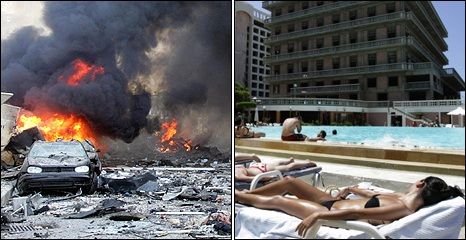BBC News Magazine ![]()

The expression "it's like Beirut" is a much-used comparison for everything from violent riots to a teenager's bedroom. Why do we still insist on associating Beirut with chaos?
When North East Lincolnshire Council announced this week it would be demolishing a notorious crime-ridden street in Grimsby, one resident said it would no longer be "worse than Beirut".
It's not the first time the comparison has been used and probably not the last. From Joe Public to world leaders, the phrase "like Beirut" is shorthand for chaos and decay.
Since 1990, the year after the Lebanese civil war ended, there have been more than 50 recorded usages of the phrase, according to Robert Groves, editor of Collins Dictionaries. It began with a reference to a Chicago slum on American National Public Radio.
Lebanese blogger Jad Aoun records usage of the phrase and mails the culprit a "looks like Beirut" certificate.
The Maronite church is affiliated to the Roman Catholic Church and recognizes the authority of the pope.
The Maronite community held today events to honour Saint Maroun, father of the Maronite Church, who died 1,600 years ago.
Maronite Patriarch Nasrallah Sfeir and top government officials commemorated the event in Saint George’s Church, in Beirut. President Michel Suleiman, Speaker Nabih Berri, Prime Minister Saad Hariri and several cabinet ministers, MPs and politicians, including Lebanese forces’ leader Samir Geagea.
Meanwhile, other Lebanese Christians who belong to the pro-Syrian opposition, celebrated the mass at Saint Maroun church in Brad, near the Syrian city of Aleppo. That mass was attended by Christian leader Michel Aoun, former President Emile Lahoud, and Head of the Marada Party Sleiman Frangieh including many officials from Lebanon and other Syrian officials.
“Our visit today bears a historic importance since it sets a new track to revive true Eastern Christian culture because the Christian church originated from here," Aoun said.
The neighborhood Wadi Abu Jamil in downtown Beirut is empty and quiet these days. But back in the old days it used to be a bustling place known as Beirut's Jewish neighborhood.
It is where the Jewish physician Dr. Shams was said to treat patients who suffered economically for free and where, at night, people from the neighborhood gathered at the house of one of the Jewish families to watch television because they were the only ones in the area who had one at the time.
But after multiple Arab-Israeli wars, Israeli invasions and Lebanese Hezbollah's 2006 war with the Jewish state, Dr. Shams and most of the other Jewish families from "The Valley of the Jews," as the neighborhood also was called, are long gone.
Khazen History


Historical Feature:
Churches and Monasteries of the Khazen family

St. Anthony of Padua Church in Ballouneh
Mar Abda Church in Bakaatit Kanaan
Saint Michael Church in Bkaatouta
Saint Therese Church in Qolayaat
Saint Simeon Stylites (مار سمعان العامودي) Church In Ajaltoun
Virgin Mary Church (سيدة المعونات) in Sheilé
Assumption of Mary Church in Ballouneh
1 - The sword of the Maronite Prince
2 - LES KHAZEN CONSULS DE FRANCE
3 - LES MARONITES & LES KHAZEN
4 - LES MAAN & LES KHAZEN
5 - ORIGINE DE LA FAMILLE
Population Movements to Keserwan - The Khazens and The Maans
ما جاء عن الثورة في المقاطعة الكسروانية
ثورة أهالي كسروان على المشايخ الخوازنة وأسبابها
Origins of the "Prince of Maronite" Title
Growing diversity: the Khazin sheiks and the clergy in the first decades of the 18th century
Historical Members:
Barbar Beik El Khazen [English]
Patriach Toubia Kaiss El Khazen(Biography & Life Part1 Part2) (Arabic)
Patriach Youssef Dargham El Khazen (Cont'd)
Cheikh Bishara Jafal El Khazen
Patriarch Youssef Raji El Khazen
The Martyrs Cheikh Philippe & Cheikh Farid El Khazen
Cheikh Nawfal El Khazen (Consul De France)
Cheikh Hossun El Khazen (Consul De France)
Cheikh Abou-Nawfal El Khazen (Consul De France)
Cheikh Francis Abee Nader & his son Yousef
Cheikh Abou-Kanso El Khazen (Consul De France)
Cheikh Abou Nader El Khazen
Cheikh Chafic El Khazen
Cheikh Keserwan El Khazen
Cheikh Serhal El Khazen [English]
Cheikh Rafiq El Khazen [English]
Cheikh Hanna El Khazen
Cheikha Arzi El Khazen
Marie El Khazen